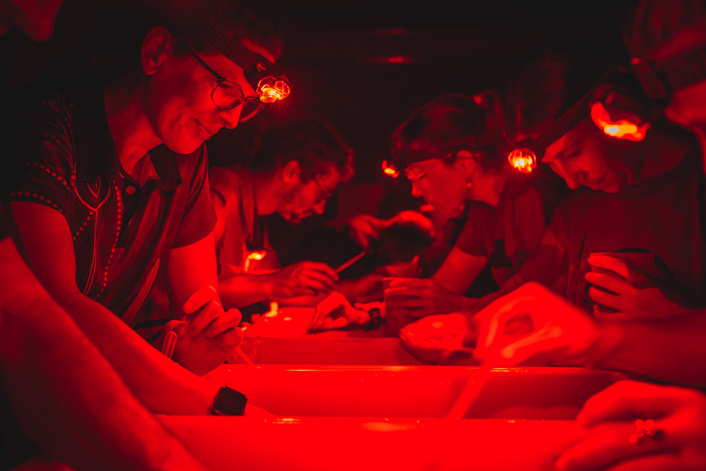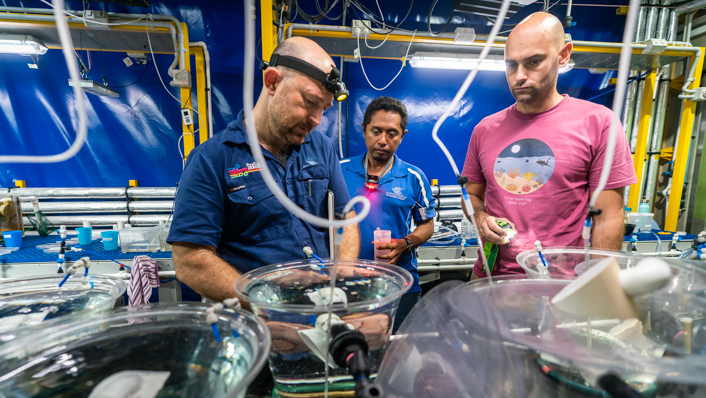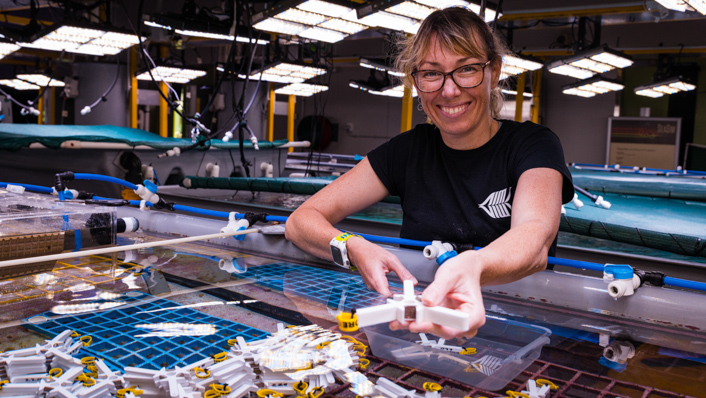AIMS is developing techniques in coral aquaculture to support large-scale efforts to help reefs recover more quickly from disturbances.
Our investigations extend from breeding coral in aquaria to delivering young corals into the field temporarily and monitoring their survival.
Large numbers of young reef-building corals across multiple species are bred in the AIMS National Sea Simulator. These corals are used in trials to
- improve aquaculture methods,
- determine efficient approaches to deliver large numbers of young corals into the wild, and
- improve their survival on the reef.
This includes corals which may be bred with higher tolerance to heat.
This research and development is built on AIMS’ long history of breeding and maintaining animals in aquaculture.
Our approach
We are focussed on developing techniques which can be scaled up to support reef recovery across entire reefs or regions where they will create the greatest impact. Techniques will be used in concert with heat tolerant coral research, genetic modelling, ecological and oceanographic data and reef managers to maximise the impact of future reef restoration efforts.
We also work with Traditional Owners to ensure the values and knowledge of sea country are included in the process.
Our cross-disciplinary approach ensures efforts are effective, efficient, and leverage natural processes as much as possible.
AIMS’ coral aquaculture research supports two major research programs – the Australian Coral Reef Resilience Initiative, a partnership with BHP, and the Australian Government’s Reef Restoration and Adaptation Program.
Breeding a variety of corals
Coral reefs are incredibly diverse – there are more than 600 species of hard corals recognised on the Great Barrier Reef alone. Any recovery interventions need to account for a diversity of reef-building coral species, and coral shapes.
While scientists have studied coral reproduction on the Great Barrier Reef for more than four decades, the number of hard coral species bred in captivity is very small.
AIMS scientists are expanding the number of hard coral species bred in aquaria. Over the past five years, we have successfully bred over 30 species in the National Sea Simulator.
Thinking differently about spawning – scaling up
Large-scale solutions for reef recovery require highly efficient aquaria facilities and processes.
AIMS’ National Sea Simulator is the most sophisticated research aquaria in the world. We are doubling the size of the facility to ensure we have the volume and skills to boost aquaculture research to meet demands.
We are also thinking differently about how we work with spawning corals to ensure high volumes of egg, sperm and resulting baby corals.
Manual tasks during coral spawning are becoming automated. For example, the gentle collection of egg and sperm bundles from aquarium tanks is moving from handheld pipettes to gentle automatic ‘skimmers.’ The automatic collection systems are designed to harvest and fertilise millions of coral embryos without the involvement of manual operations. This is fundamental step for upscaling coral aquaculture.
Delivering precious corals to the reef
While billions of eggs and sperm are released during coral spawning, only a small portion will fertilise, and even fewer will settle onto a reef. Just like plants, not all seeds will grow.
We are investigating what causes the high rates of mortality when corals are small, and ways to protect them during this vulnerable period.
We are looking at overcoming the causes of these bottlenecks using innovative technologies, like settling corals on engineered devices in captivity, before being released into the wild.
Devices are being designed, developed and tested using different materials and shapes. These devices and their young corals are then tested at sea in different reef environments using different methods to see what works – and what doesn’t.
These investigations on how to most effectively sow coral ‘seeds’ helps us understand the ‘where, what, when and how’ of coral seeding, to ensure the corals’ best chance to survive.
Making young corals in aquaculture healthy and plentiful
Young corals have a tough life. Even in aquarium conditions they compete for space with algae and are susceptible to disease in their first year.
Corals are also vulnerable during transport, making their journey onto their destination reef a treacherous one.
We are researching how to give young corals in aquaculture a helping hand to ensure the best, healthiest start in life.
Our research includes work on:
- probiotics
- antifouling surfaces and grazers to reduce competition with algae
- coral nutrition
- building coral resilience.
Results of this research will contribute to better health, growth and long-term success of corals grown in aquaculture facilities and will ultimately help fast-track reef recovery.





